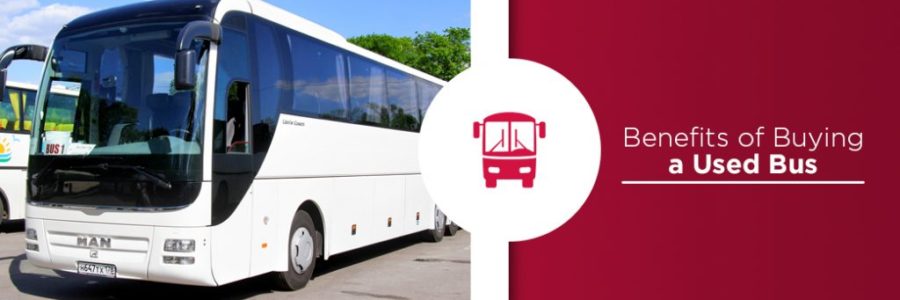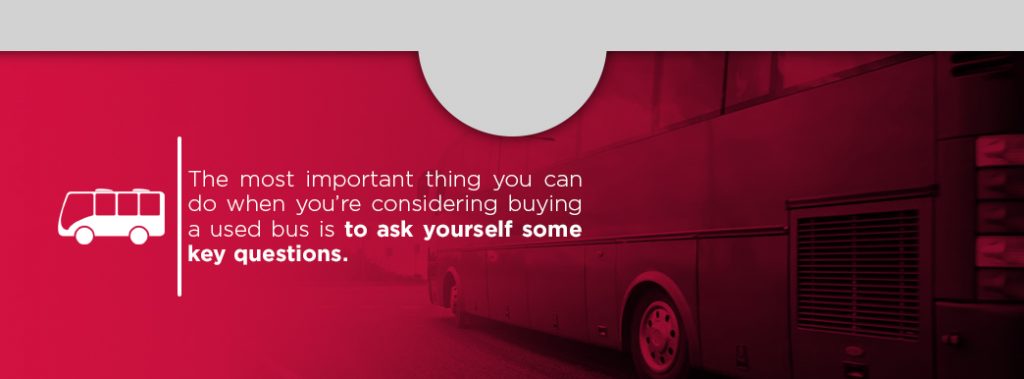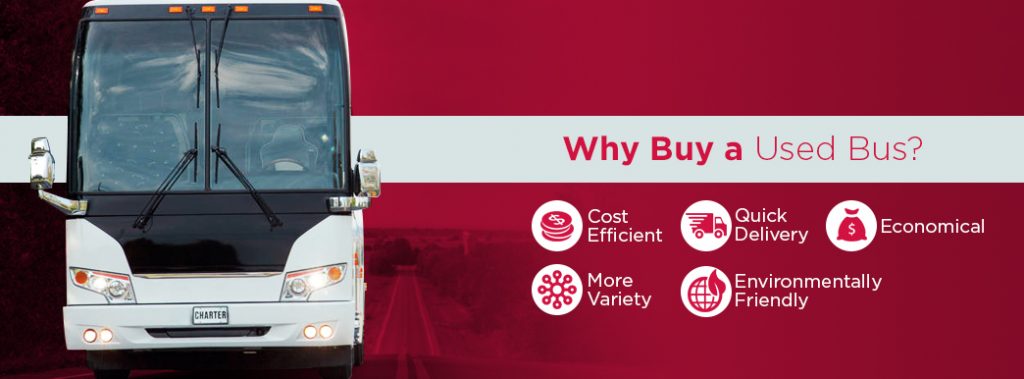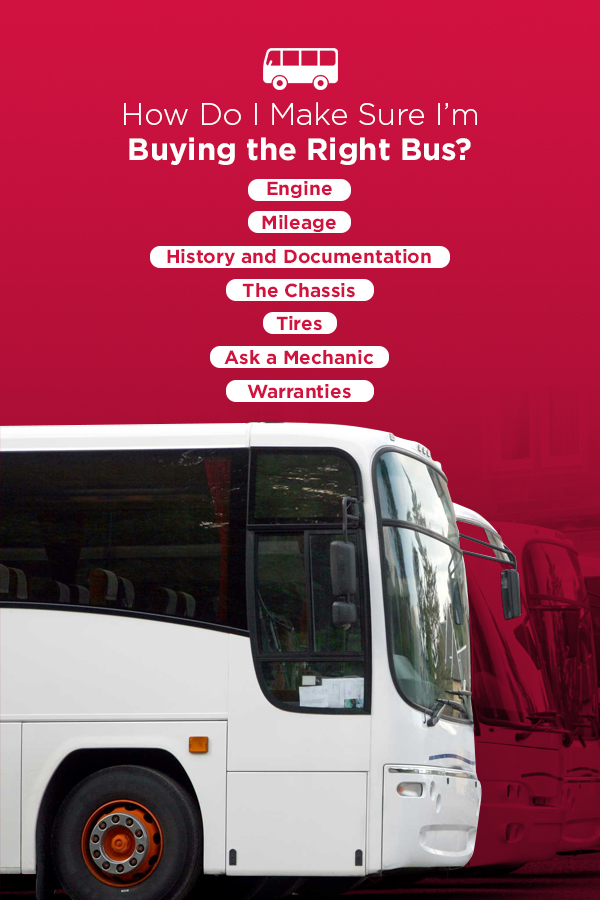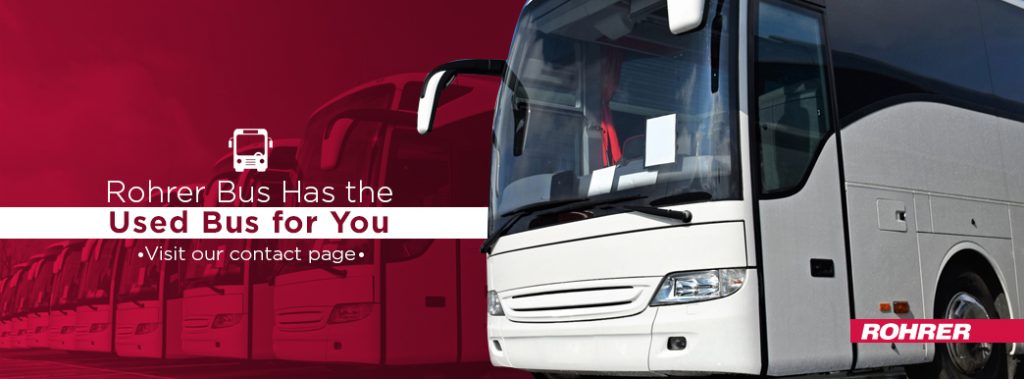When it comes to buying a bus, the question is, should you buy a new bus or a preowned bus? If you have the money and you can afford to wait the several months it takes from the time you order a new bus to the time of delivery, that may be the best way to go. However, if you’re looking for a more cost-efficient purchase where you can expect quick delivery and choose from a wide variety of buses, then you should seriously consider buying a used bus.
Questions to Ask Yourself Before You Buy a Used Bus
The most important thing you can do when you’re considering buying a used bus is to ask yourself some key questions. These questions will help you solidify in your own mind the kind of bus that you need, why you need it and how you intend to pay for it.
1. Why Buy a Used Bus and What Would I Use It For?
The way you answer this question will determine the kind of bus that you need. Do you need a bus to move disabled patients to and from a seniors’ residence or a hospital? A shuttle bus may be what you need. Will this bus only be used to transport people to church on the weekends? The kind of bus you need depends on capacity. If the number is small, then a minibus or shuttle bus may be the best answer. If you’re looking at a large group, a used school bus is more appropriate. Will you use this bus to take students on field trips or use it for a regular route? A used school bus is ideal.
As you can see, asking yourself why you need the bus is the first step towards choosing the right model.
2. What About Capacity?
Again, consider your needs. Will the capacity always be similar? If you expect ridership to fluctuate, you might need a bigger or more flexible bus.
3. What About Comfort?
If the bus will only be used for shorter trips, such as shuttling people back and forth between two buildings or taking people from a parking lot to a business or an airport and back, then the comfort of the rider is probably not a serious concern because of the shorter duration of the trip.
If this used bus will be used for longer trips, such as activity outings like a school trip or to take church groups to various churches around their community, then comfort is more of an issue. Longer trips most often require at least that the bus is air-conditioned.
3. How Fuel-Efficient Is the Bus?
You’ll want the engine of your used bus to be appropriate for the kind of trip that the bus will make. Top fuel efficiency may not be as important if the bus is going to make short, quick trips. For longer trips, you’ll want to find a bus that has greater fuel efficiency or else the money that you’ll save by purchasing a used bus may disappear in fuel costs.
4. Is Accessibility an Issue?
If you’re purchasing a preowned bus for a seniors’ facility or for a bus route designed for passengers with limited mobility who may need wheelchairs, you’ll want to find a bus that has a mechanism that allows wheelchair access.
5. Where Am I Driving This Used Bus?
Do you plan to use the bus in an urban or a rural setting? A rural setting probably means more gravel roads, so you may want a newer model bus that is more durable. If the bus will be used in an urban setting, this is not as important since well-maintained roads result in less wear and tear on the vehicle.
6. How I Plan to Pay for This Bus?
If you plan to pay using cash, this may enable you to buy a slightly better bus. If you don’t have the cash, however, don’t worry. Used buses are like used cars — most dealers, including Rohrer Bus, can offer you great financing options.
This checklist will allow you to determine whether you need a church, a school, or an activity bus. It will also help you avoid the temptation of the “great deal.” There’s no sense paying less for a bus that doesn’t suit your needs and then trying to shoehorn it into a situation for which you need it.
Why Buy a Used Bus?
Now let’s look at the top five benefits of buying a used bus!
1. Cost Efficient
While purchasing a new bus may be more exciting — after all, who doesn’t love that new car smell — but excitement may not be what helps your bottom line the most.
Cost
A used bus could cost just one-third of what a new bus would cost. If you have started a new business and money is tight, but you need a bus to move your goods or your employees around, a preowned bus is ideal.
Depreciation
Remember, the moment you drive that new bus off the parking lot, it immediately begins to depreciate, usually by as much as 11%. After the first year of owning that new bus, it could be worth 25% less. After three years, it will only be worth half as much as you paid for it.
Used buses, on the other hand, won’t depreciate anywhere near as rapidly as new buses. So, if you ever need to resell your used bus, you’ll probably be able to recoup much more of your initial investment.
2. Quick Delivery
Since many new buses require custom specifications, it may be anywhere between nine and 12 months before a new bus arrives. That’s fine if you have the time to wait around for your new bus. If this timeline seems too long, you are much better off purchasing a refurbished used bus. Depending on your needs, you may be able to find a preowned bus for sale immediately and drive your bus off the lot the same day you purchase it! Even if you need it to be refurbished in some special way, you probably won’t have to wait any longer than two months before your bus is ready to use.
3. Economical
When you consider what your needs are today and what they might be in the future — increased ridership, for example — you also need to consider your available budget. If you invest in refurbished used buses, you can stretch your budget and manage the age and size of your fleet as well as meet your riders’ expectations quickly and efficiently.
On the other hand, preowned buses also make sense if you won’t need the vehicle every day. Why purchase a new bus if it’s only going to be used for a group which meets once a week, or perhaps even less? If the bus is not going to be traveling far or accumulating a lot of mileage, buying a used bus is a much better way to use your available dollars. What you save on purchasing a used bus can be invested into other parts of your operation.
4. More Variety
Since you would pay so much less for a used bus than a new bus, this enables you to consider buying more than one bus depending on your needs. For instance, you may need a shuttle bus to move smaller groups of people between buildings or from one location to another. You may also need a larger bus, however, like a charter bus or a school bus to take larger groups of people on longer trips.
It could be financially very difficult to buy two new buses for these different purposes. However, because of the savings that are available with used charter buses for sale or a used school bus for sale, you can accomplish both goals and maybe even save some cash in the long run.
As with every make of car, you can purchase a variety of buses. A used school bus, a used charter bus, a used coach bus, a used shuttle, a used mini-school bus — you have a lot of options from which to make a choice. When you answer the questions listed above, that will help you narrow down your choice.
5. Environmentally Friendly
There is no more environmentally friendly mode of transportation than a bus. While it’s true that most buses don’t get the greatest gas mileage, whether they are new or used, what makes them so environmentally friendly is that they can carry so many people. A coach bus or a school bus can carry 30 to 40 passengers. Even a shuttle bus can often accommodate up to 20 people. This means that a motor-coach bus gets about 239 miles per gallon per passenger, making it the most environmentally friendly and gas efficient mode of transportation.
Regardless of the kind of bus you purchase, you’re going to get similar results in terms of miles per gallon per passenger. By purchasing a used bus, you are contributing environmentally to your community. For example, if you run a shuttle bus to pick up your employees in regular spots throughout your community and then return them there in the evening, you’re taking a lot of automobiles off the roads. In addition, by choosing a preowned bus over a new one, you won’t be contributing to the demand of new vehicles and you’ll be reducing production waste. Purchasing a used bus makes you an environmentally conscious citizen and a good business person. When you purchase a used bus, it’s proof that you can be smart both financially and environmentally.
How Do I Make Sure I’m Buying the Right Bus?
So you’ve decided to buy a used bus. Now you need to know how to buy the right bus. It’s the same thing as buying a used car. You don’t want to walk onto a lot and walk off with the first thing the salesperson shows you. You want to make sure that you’re buying the best used bus you can. Here are a few features you should check before you commit yourself to a purchase:
1. Engine
The most important thing when it comes to engines is don’t overbuy what you need. Just because you can afford a big engine doesn’t mean you need a big engine. Big engines use a lot of gas. Just think about how you intend to use the bus; this will help you determine the size of the engine that you need. Our friendly and knowledgeable sales team at Rohrer Bus will be more than happy to help you explore your options as well!
2. Mileage
It doesn’t matter much how old the bus is; the key factor is how many miles it has traveled. You could have a 10-year-old bus that was only used to transport groups on the weekend and thus has limited mileage as opposed to a three-year-old bus that was used constantly and has a lot of mileage.
3. History and Documentation
This is one of the reasons why it’s always best to buy a used bus from a dealer rather than an individual. A reputable dealer is much more likely to have the bus title and its service records available for you to see. A history of the bus will show you if there have been repeated repairs in one part of the bus. It can also show you that, overall, the bus has performed very well.
Think twice about purchasing a used bus that doesn’t have a verifiable record of service.
4. The Chassis
Closely inspect the vehicle for scratches and dents. You also want to keep an eye out for rust. More than anything else, rust can be the downfall of an otherwise totally sound used bus. A used bus may have also received a new paint job. That’s not a problem as long as the finish is sealed, smooth, and rust-free.
5. Tires
This is another reason to buy from a reputable dealer. Dealers will make sure that the tires on a preowned bus are roadworthy. If you purchase a bus from an individual, you’ll likely have to buy it as is.
6. Ask a Mechanic
Just as you would when purchasing a used car, ask a mechanic you trust to look over the bus for you. A mechanic can spot any potential problems and tell you how serious they are and when you may need to get them fixed.
7. Warranties
Depending on how old the bus is, it may still have a warranty available. A dealership warranty is also an idea because it makes buying a used bus less stressful. A used bus in good condition should have a reasonable service contract. Even though it adds a few more dollars to your purchase, it will be money well spent.
Rohrer Bus Has the Used Bus for You
When you’re looking to buy a preowned bus for your business, church, community group, or sports club, Rohrer Bus can help you find what you’re looking for. We have one of the country’s largest inventories of used buses for sale. We can offer hundreds of available vehicles including used school buses, used school transportation and wheelchair accessible vans, and used commercial buses. Even if the bus you need isn’t on our lot, we will likely know where it can be found.
If you would like to know more about the used or rental buses that we have available, give us a call at 717-546-9464 or visit our contact page, where you can tell us what kind of bus you’re interested in purchasing and a member of our team will get back to you as soon as possible.




